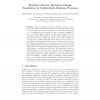Free Online Productivity Tools
i2Speak
i2Symbol
i2OCR
iTex2Img
iWeb2Print
iWeb2Shot
i2Type
iPdf2Split
iPdf2Merge
i2Bopomofo
i2Arabic
i2Style
i2Image
i2PDF
iLatex2Rtf
Sci2ools
OTM
2015
Springer
2015
Springer
Finding Collective Decisions: Change Negotiation in Collaborative Business Processes
Change propagation has been identified as major concern for process collaborations during the last years. Although changes might become necessary for various reasons, they can often not be kept local, i.e., at one partner’s side, but must be partly or entirely propagated to one or several other partners. Due to the autonomy of partners in a collaboration, change effects cannot be imposed on the partners, but must be agreed upon in a consensual way. In our model of this collective decision process, we assume that each partner that becomes involved in a negotiation has different alternatives on how a change may be realized, and evaluates these alternatives according to his or her individual costs and benefits (utilities). This paper presents models from group decision making that can be applied for handling change negotiations in process collaborations in an efficient and fair way. The theoretical models are evaluated based on a proof-of-concept prototype that integrates an existin...
| Added | 16 Apr 2016 |
| Updated | 16 Apr 2016 |
| Type | Journal |
| Year | 2015 |
| Where | OTM |
| Authors | Walid Fdhila, Conrad Indiono, Stefanie Rinderle-Ma, Rudolf Vetschera |
Comments (0)

